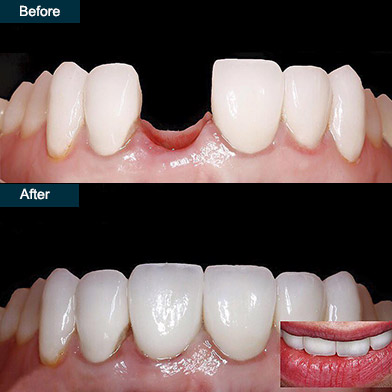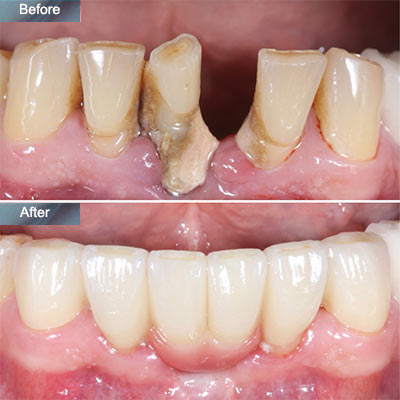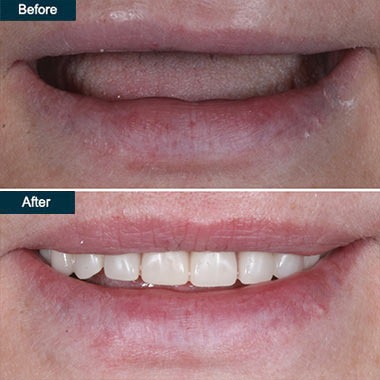Table of contents
Dental implants are an increasingly popular option and are regarded by many dental professionals as the gold standard for restoring missing teeth.
However, the procedure does need a short surgical procedure, and treatment can cost more initially. These are both facts that can deter people from considering dental implants, while others might think they are unsuitable or too old.
It can seem as if implant treatment is surrounded by mystery, but the process is very straightforward, although it requires meticulous planning. Some people will immediately decide dental implants are their treatment of choice, while others are less certain.

One thing is for sure, if you are facing tooth loss, the more you learn about all available options, the more able you are to make an informed treatment choice.
There are several options for restoring lost teeth, depending on how many are lost.

If you lose one or two teeth and your remaining teeth are reasonably healthy and strong, you could opt for a dental bridge supported by your real teeth. Both teeth on either side of the gap are reshaped and crowned. A pontic or replacement tooth is fixed to the crowns. The replacement tooth looks just like a real tooth and rests on the gums.
A dental bridge is relatively quick to make and non-invasive, but you will need to have healthy teeth reshaped, and these will always need crowns in the future, even if you decide to have dental implants later on.
Read more: Dental bridge vs dental implants
Dentures are suitable for people missing multiple teeth and who may not have teeth strong enough to support a conventional bridge.
The denture rests directly on the gums, and if natural teeth are present, it may have clasps that fit around these teeth to help hold it in place more stably.

Although a cost-effective option that requires no surgery, dentures can create many problems as they soon become ill-fitting and tricky to wear due to changes to the jawbone’s shape. Your jawbone naturally changes shape after you lose your teeth and bone is absorbed.
Read more:
What Are Dentures and Is There an Alternative?
What are the Options Available for Loose Dentures?
Dentures vs Implants
Denture Implants
Dental implants are the most versatile choice and can restore one or more teeth or complete arches of teeth.
An implant is a small screw or post that must be surgically inserted into the jawbone. Once in the jawbone, the implant quickly becomes part of the bone as new bone cells grow on and around it, fusing it firmly in place, a process that only takes a few months.
Once a dental implant is firmly fused, it can be used to support a single missing tooth. If you have more than one teeth missing that were side by side, two or more dental implants can support a dental bridge, so there is no need to reshape perfectly healthy natural teeth.
You can even choose to have a dental bridge that replaces a complete arch of teeth and which is firmly fixed onto the implants so only your implant dentist can remove it.
Another option is to have an implant-supported denture, a cost-effective solution for people missing an entire arch of teeth.
Instead of resting directly on the gums, the denture clips securely onto the implants so it cannot move, greatly increasing biting strength and making it easier to chew foods properly.
The above is only a quick overview of potential solutions available, but to find out which option will suit your needs best, you must visit a good dental implant dentist, such as Dr. Khabensky in Brooklyn, NY.
Two factors must be carefully considered if you wish to have dental implants, which are your current dental and medical health. Your implant dentist will need to discuss your complete medical history, and they will examine your mouth carefully.
To be a good candidate, you need to have good health and no active signs of dental disease. The good news is most people are suitable for treatment.
If you are concerned about the surgical procedure needed to insert dental implants, talk to your dentist about your feelings.
Dr. Khabensky can explain exactly what will happen, how it will feel, and what to expect afterward during the healing period.
Suppose you only need a single dental implant. In that case, you can probably have it inserted using local anesthesia, and most people are pleasantly surprised at how short and comfortable the process feels. Your implant dentist can most likely put any concerns or fears you have to rest, but otherwise, you could always discuss using sedation dentistry.
Sedation dentistry is helpful for anyone with dental fears or anxieties or needs multiple implants inserted during a procedure that will take longer, or who needs a more complex treatment.
There are several sedation options available:
The sedative may contain an amnesiac, so you will most likely remember nothing or very little about the treatment afterward.
Good dental implant treatment does cost more than other tooth-replacement solutions, but you are buying an option that could last for life or at least for many years to come.
It is usually a very cost-effective option in the longer term, and that’s before you consider the benefits to your dental health and your overall sense of well-being and self-confidence.
Dental implants are the only treatment that helps protect your jawbone against further bone loss and helps preserve your natural teeth fully intact.
Also, they will give you a biting strength similar to real teeth, and even if you have an implant-supported denture, you will still find your biting strength is much greater than a conventional denture.